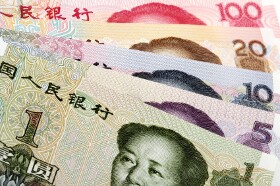
The Chinese yuan is seeking direction after President Donald Trump accused the worldâs second-largest economy of being a currency manipulator. This prompted officials to deny the allegation, pointing out that the yuanâs exchange rate is determined by the market, not Beijing. But Trump has made these suggestions before, despite the yuan appreciating for several years prior to its recent plunge.
Speaking in an interview with Reuters, the president accused China and the European Union (EU) of being currency manipulators, and their moves, he says, have cost the US Treasury billions of dollars.
IÂ think China is manipulating their currency, absolutely. And I think the euro is being manipulated also. … And what they are doing is making up for the fact that they are now paying a lot for â hundreds of millions of dollars, and in some cases billions of dollars â into the United States Treasury â and so theyâre being accommodated and Iâm not, and Iâll still win.
Li Bo, director of monetary policy at the Peopleâs Bank of China (PBOC), rebuked the presidentâs remarks, telling a briefing on Tuesday that the central bank is not influencing the currency in any way. Doubling down on previous comments from state officials, Li reiterated that the government will not use the yuan as a weapon in its trade spat with the US.
Last month, US Treasury Secretary Steven Mnuchin confirmed to reporters that Washington and other G7 nations will monitor the yuanâs movement quite closely. At the same time, Trump told CNBC that the yuan âis dropping like a rock, and our currency is going up, and I have to tell you it puts us at a disadvantage.”
Even on the campaign trail, Trump incorrectly said in debates that Beijing was purposely debasing the yuan. Between 2014 and 2017, the yuan has climbed 14% against the greenback.
While it is true that China would benefit from a weaker currency because its goods would be more attractive to foreign investors, there are still several downsides, including capital fleeing the country. Also, the consensus is that the yuanâs depreciation over the last year has stemmed from a sluggish national economy, the trade war, and skyrocketing debt levels.
Moreover, the federal government and the central bank have been utilizing a series of stabilization measures to support the yuan in recent weeks, something that contradicts the assertions that China is actively trying to weaken the currency.
The USD/CNY currency pair dipped 0.1% to 6.8402, from an opening of 6.8478, at 13:41 GMT on Wednesday. The EUR/USD advanced 0.29% to 1.1605, from an opening of 1.1573.
If you have any questions, comments or opinions regarding the Chinese Yuan,
feel free to post them using the commentary form below.